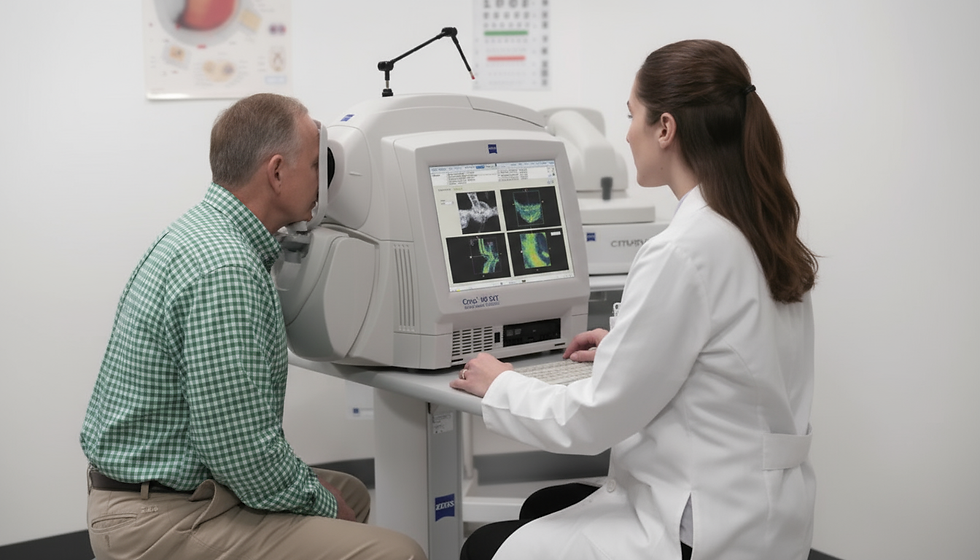Understanding and Managing Age-Related Macular Degeneration (AMD)
- Dr. Leena Panaich

- Oct 29, 2025
- 4 min read

At Lynn Valley Optometry, we are committed to protecting your vision through early detection and proactive management of Age-Related Macular Degeneration (AMD) — one of the most common causes of central vision loss in adults over 50.
What Is Age-Related Macular Degeneration?
Age-related macular degeneration (AMD) is a condition that affects the macula, the part of the retina responsible for sharp, detailed vision. While there is no cure, early diagnosis and personalized care can help preserve sight and quality of life.
There are two main types:
Dry AMD: gradual thinning of the macula and the buildup of drusen — tiny yellow deposits made up of lipids and proteins that form beneath the retina. Drusen are often the earliest sign of AMD and can interfere with how the retina functions over time.
Wet AMD: caused by abnormal blood vessels growing under the retina that leak fluid or blood, leading to faster vision loss if not treated promptly.
Key Risk Factors:
Age (over 50)
Family history or genetics
Smoking
UV light exposure
Cardiovascular disease
What Are the First Symptoms of Macular Degeneration?
Early AMD may cause blurred central vision, difficulty seeing fine details, or straight lines appearing wavy. You may also need brighter light for reading or notice faded colors. Because AMD often starts silently, routine eye exams are the best way to detect changes before symptoms appear.
Can You Stop Macular Degeneration from Progressing?
While there’s no cure, you can slow AMD progression with healthy daily habits:
Quit smoking — smokers are up to four times more likely to develop AMD.
Eat a macula-friendly diet — leafy greens, colorful fruits, nuts, and omega-3-rich foods.
AREDS2 Supplements: The AREDS2 formula (with lutein, zeaxanthin, vitamins C & E, zinc, and copper) can help slow AMD progression. Because needs vary by AMD stage and zinc tolerance, it’s best to discuss supplements with your optometrist before starting them.
Protect your eyes — wear UV-blocking sunglasses and blue-light-filter coatings for added retinal defense.
Maintain overall health — manage blood pressure, cholesterol, and blood sugar.
Can Anything Be Done for Age-Related Macular Degeneration?
Yes. While AMD cannot be completely reversed, early detection and lifestyle changes can slow or stabilize its progression. At Lynn Valley Optometry, we use advanced imaging to detect AMD early and track changes over time. These scans are quick, painless, and give us a detailed look at the health of your retina:
OCT (Optical Coherence Tomography) – works like an “ultrasound with light,” creating detailed 3D images of the macula so we can detect early changes.
Fundus Photography – takes a clear color photo of the back of your eye, helping us monitor macular changes.
FAF (Fundus Autofluorescence) – uses gentle light to show how well your retinal cells are functioning and to highlight any early areas of stress.
MPOD (Macular Pigment Optical Density) – measures the natural pigment layer that protects your macula from harmful blue light and supports long-term retinal health.
These technologies allow us to detect AMD before vision changes occur, giving you the best chance for early, effective management.
Comprehensive AMD Care and New Treatment Options
Treatment for Wet AMD
When fluid or bleeding is detected beneath the retina, we provide prompt referral to a retinal ophthalmologist for specialized care. Early treatment is essential to stabilize vision.
New Therapies for Dry AMD
Lynn Valley Optometry offers complete dry AMD management in North Vancouver, combining nutrition, continuous monitoring, and advanced retinal support — including two new non-invasive treatments for dry AMD proven effective in emerging research.
MacuMira™ Microcurrent Therapy

A gentle, non-invasive treatment that delivers mild electrical stimulation around the eyes to enhance cellular metabolism and retinal circulation.
Clinical studies have shown improvements in contrast sensitivity and visual function in some patients with dry AMD.
ArunaLight™ Photobiomodulation

Uses safe, targeted red and near-infrared light to energize and repair retinal cells, improving blood flow and reducing oxidative stress.
Recent multicentre studies have demonstrated measurable gains in visual acuity and contrast sensitivity, suggesting photobiomodulation can help slow functional decline in dry AMD.
When in Doubt, Come See Us!
AMD often progresses silently, but early detection makes all the difference.At Lynn Valley Optometry, we combine advanced imaging — OCT, Fundus Photography, FAF, and MPOD testing— with personalized prevention and treatment strategies to protect your vision for years to come.
Whether you have a family history of AMD, notice visual changes, or simply want a baseline screening, our team is here to help.
Call 604-987-9191 or Book an AMD Consultation
Protect your vision — early detection is the key to slowing macular degeneration.
Frequently Asked Questions
How Serious Is Age-Related Macular Degeneration?
AMD affects your ability to read, drive, and recognize faces — but it does not cause total blindness. Peripheral vision usually remains intact, allowing independence with proper management and assistive devices.
Can Vision Be Restored After Macular Degeneration?
While lost central vision can’t be fully regained, combining supportive therapies, eye health supplements, and simple lifestyle changes can help you maintain functional vision and enjoy a better quality of life.
Does Macular Degeneration Cause Blindness?'
Macular degeneration affects the center of your vision, not the entire visual field, so most people do not go completely blind. With consistent monitoring and timely treatment, many patients maintain functional vision for decades.



Comments